Plot summary
It is 1794 and Paris, "despite the horrors that had stained her walls - has remained a city of pleasure, and the knife of the guillotine did scarce descend more often than did the drop-scenes on the stage."
The plot begins when Sir Percy, the Scarlet Pimpernel, reluctantly agrees to take Armand St. Just, brother of his wife, Marguerite, with him to France as part of a plan to rescue the young Dauphin.
Percy warns Armand not to renew any friendships while in Paris, but it doesn't take long before Armand has ignored his warnings and renewed a friendship with the scheming Baron de Batz (in the pay of the Austrian government), who wants to free the Dauphin himself and despises the Scarlet Pimpernel and all he represents.
Whilst attending the opera with De Batz, Armand foolishly tells him that he is in the league of the Scarlet Pimpernel. While there, he falls in love with a young actress named Citizeness Jeanne L'Ange. De Batz introduces the couple backstage at the theatre and once they have fallen for each other, De Batz tells Citizen Heron of the general committee of Public Safety where and when they have arranged to meet.
After covering for Armand at her house, L'Ange is arrested and thrown into jail. Learning of her peril and in the throes of passion, Armand fails to trust Sir Percy who has told him that he will rescue Jeanne, and forgets his promise to his leader.
Armand, desperate to share Jeanne's fate, runs to the gate of the Temple prison and screams, "Long Live the King." There he is intercepted by none other than Percy's arch enemy, Chauvelin.
Faced with the death of his love, Armand betrays Percy, unaware that The Pimpernel has already secured Jeanne's freedom. Sir Percy is then captured and imprisoned by Chauvelin and Heron in the cell that was home to Marie Antoinette in her last days.
Chauvelin insists that Percy is to be deprived of sleep in the hope that he will be weakened and disclose where young Capet, the uncrowned King of France, is being held following his rescue.
After 17 days in prison, Percy is sure that the dauphin has been transported safely into Holland. He then contrives, by pretending to crack and confess the dauphin's whereabouts, to make his escape. He tells Chauvelin and Heron that the dauphin is being held in an area in the north, near the coast of France, but that he has to show them, rather than tell them, because the paths are nameless and too small for them to find without him.
Chauvelin and Heron, skeptical, bring along Armand and Marguerite as hostages. Once in the north, Percy takes advantage of a chance when Chauvelin and Heron are separated, and darkness, to subdue Heron, bind and truss him, put on his clothes, and direct the guileless French soldiers (who think that the bound Heron is Percy) to put him in the gated yard of a church. Percy, still thought to be Heron, drives a carriage with Marguerite and Armand inside to the coast, where his ship is waiting for them.

Dauphin of France, originally Dauphin of Viennois, was the title given to the heir apparent to the throne of France from 1350 to 1791, and from 1824 to 1830. The word dauphin is French for dolphin and was the hereditary title of the ruler of the Dauphiné of Viennois. While early heirs were granted these lands to rule, eventually only the title was granted.

The Scarlet Pimpernel is the first novel in a series of historical fiction by Baroness Orczy, published in 1905. It was written after her stage play of the same title enjoyed a long run in London, having opened in Nottingham in 1903.

Baroness Emma Orczy, usually known as Baroness Orczy or to her family and friends as Emmuska Orczy, was a Hungarian-born British novelist and playwright. She is best known for her series of novels featuring the Scarlet Pimpernel, the alter ego of Sir Percy Blakeney, a wealthy English fop who turns into a quick-thinking escape artist in order to save French aristocrats from "Madame Guillotine" during the French Revolution, establishing the "hero with a secret identity" in popular culture.
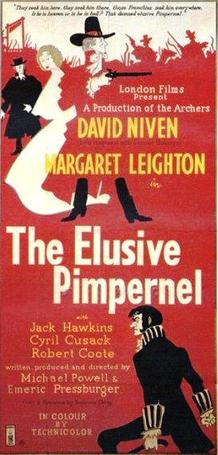
The Elusive Pimpernel is a 1950 British period adventure film by the British-based director-writer team of Michael Powell and Emeric Pressburger, based on the novel The Scarlet Pimpernel (1905) by Baroness Emmuska Orczy. It was released in the United States under the title The Fighting Pimpernel. The picture stars David Niven as Sir Percy Blakeney, Margaret Leighton as Marguerite Blakeney and features Jack Hawkins, Cyril Cusack and Robert Coote. Originally intended to be a musical, the film was re-worked as a light-hearted drama.
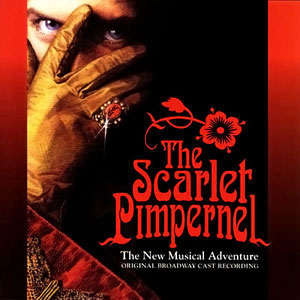
The Scarlet Pimpernel is a musical with music by Frank Wildhorn and lyrics & book by Nan Knighton, based on the 1905 novel of the same name by Baroness Orczy. The show is set in England and France during the Reign of Terror of the French Revolution. The story is a precursor to the spy fiction and the superhero genres, where a hero hides under a mild-mannered alias.

The Scarlet Pimpernel is a series of television drama programmes loosely based on Baroness Emmuska Orczy's series of novels, set during the French Revolution.
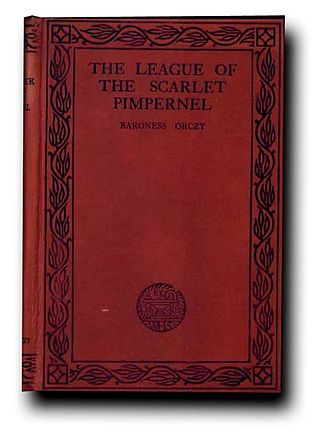
The League of the Scarlet Pimpernel is a sequel book to the classic adventure tale, The Scarlet Pimpernel. Written by Baroness Orczy and first published in 1919, the book consists of eleven short stories about Sir Percy Blakeney's exploits in rescuing various aristos and French citizens from the clutches of the guillotine.
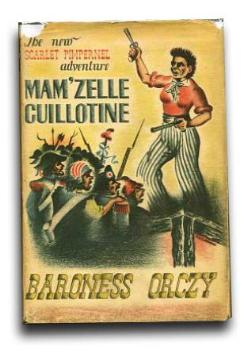
Mam'zelle Guillotine, by Baroness Orczy, is a sequel book to the classic adventure tale, The Scarlet Pimpernel. First published in 1940, it was the last novel Orczy wrote featuring the Pimpernel and is dedicated to those fighting in World War II.
"To all those who are fighting in the air, on the water and on land for our country and for our homes, I dedicate this because it is to them that we shall owe a happy issue out of all our troubles and a lasting peace." - Emmuska Orczy - Monte Carlo - 1939-40
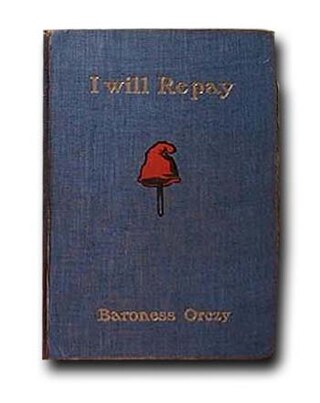
I Will Repay was written by Baroness Emmuska Orczy and originally published in 1906, this is a sequel novel to the Scarlet Pimpernel. The second Pimpernel book written by Orczy, it comes chronologically third in the series, after Sir Percy Leads the Band and before The Elusive Pimpernel.

Lord Tony's Wife, by Baroness Orczy is a sequel book to the classic adventure tale, The Scarlet Pimpernel. It was first published in 1917.

First published in 1908, The Elusive Pimpernel by Baroness Orczy is the 4th book in the classic adventure series about the Scarlet Pimpernel.

Sir Percy Hits Back is (chronologically) the ninth book in the Scarlet Pimpernel series by Baroness Orczy. It was first published in 1927.
Citizen Armand Chauvelin is the villain in Baroness Emmuska Orczy's classic novel The Scarlet Pimpernel and the various plays and films derived from the work.

The Way of the Scarlet Pimpernel, by Baroness Orczy, is another sequel book to the adventure tale, The Scarlet Pimpernel. First published in 1933, it is 6th in the series and one of the shorter Scarlet Pimpernel books. A French-language version, translated and adapted by Charlotte and Marie-Louise Desroyses, was also produced under the title Les Métamorphoses du Mouron Rouge.

The Triumph of the Scarlet Pimpernel, first published in 1922, is a book in the series about the Scarlet Pimpernel's adventures by Baroness Orczy. Again Orczy interweaves historic fact with fiction, this time through the real life figures of Thérésa Cabarrus, and Jean-Lambert Tallien; inserting the Scarlet Pimpernel as an instigator of the role Tallien played in the Thermidorian Reaction in July 1794.
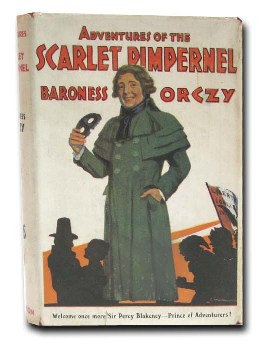
Adventures of the Scarlet Pimpernel is the second collection of short stories written by Baroness Orczy about the gallant English hero, the Scarlet Pimpernel and his League. Written in 1929 the stories, which are listed below, are set in 1793 but appear in no particular order. They occasionally refer to events in other books in the series and Orczy frequently reuses plot lines and ideas from the longer Pimpernel novels.

The Scarlet Pimpernel is a 1934 British adventure film directed by Harold Young and starring Leslie Howard, Merle Oberon, and Raymond Massey. Based on the 1905 play by Baroness Orczy and Montagu Barstow and the classic 1905 adventure novel by Orczy, the film is about an eighteenth-century English aristocrat (Howard) who leads a double life, passing himself off as an effete aristocrat while engaged in a secret effort to rescue French nobles from Robespierre's Reign of Terror. The film was produced by Alexander Korda. Howard's portrayal of the title character is often considered the definitive portrayal of the role. In 1941, he played a similar role in "'Pimpernel' Smith" but this time set in pre-WWII Germany.

Jean Pierre de Batz, Baron de Sainte-Croix, known as the Baron de Batz or de Bance,, was a French royalist and businessman. He was born in Goutz-les-Tartas (Gers), and died in Chadieu, near Vic-le-Comte (Puy-de-Dôme).

The Scarlet Pimpernel is a 1982 British romantic adventure television film set during the French Revolution. It is based on the novels The Scarlet Pimpernel (1905) and Eldorado (1913) by Baroness Emmuska Orczy, and stars Anthony Andrews as Sir Percy Blakeney/the Scarlet Pimpernel, the protagonist, Jane Seymour as Marguerite St. Just, the love interest, and Ian McKellen as Chauvelin, the antagonist.

The Return of the Scarlet Pimpernel is a 1937 British film directed by Hanns Schwarz and starring Barry K. Barnes, Sophie Stewart, Margaretta Scott and James Mason. It is a sequel to the 1934 film The Scarlet Pimpernel based on the stories by Baroness Emmuska Orczy.



















